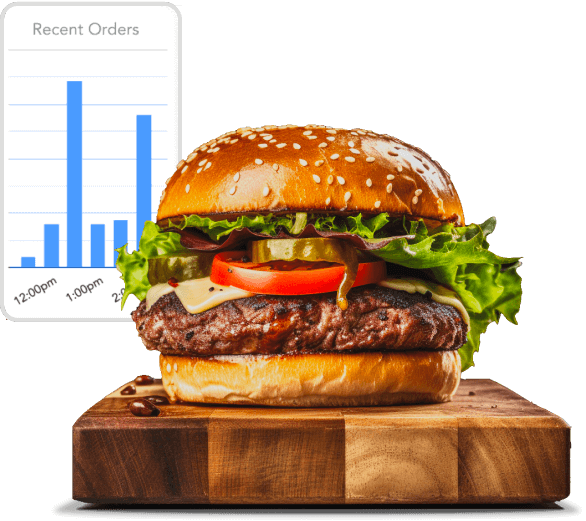Navigating Fluctuating Prices: How to Keep Your COGS Accurate
Managing a hospitality business comes with its share of challenges, but fluctuating market prices are right up there in causing headaches. These shifts can significantly affect your cost of goods sold (COGS), kicking your margins and profitability to the curb. But with a clear understanding and strategic approach, you can keep your COGS accurate and your business profitable.

Managing a hospitality business comes with its share of challenges, but fluctuating market prices are right up there in causing headaches. These shifts can significantly affect your cost of goods sold (COGS), kicking your margins and profitability to the curb. But with a clear understanding and strategic approach, you can keep your COGS accurate and your business profitable. So, don’t sweat it - we’re here to arm you with real, practical steps and strategies for maintaining control, even in the midst of marketplace chaos.
Understanding COGS and Its Importance
COGS stands for the direct costs associated with producing the goods or services that your hospitality business sells. This includes the cost of raw materials – like food and drink ingredients – and direct labour costs used in producing these goods. It's a critical financial metric, as it directly affects your gross profit and, consequently, the overall profitability of your business. By carefully tracking and controlling COGS, you can set accurate menu prices, calculate precise profit margins, make informed inventory management decisions, and ensure overall business health. Essentially, it's a vital component of your operational efficiency.
The Impact of Price Fluctuations
Picture this: you've priced your signature burger assuming the cost of beef is $10/kg. Suddenly, the market price rockets to $15/kg. That's a significant hit on your margins literally overnight. It’s frustrating - and scary! - to set a budget based on your current food and beverage costs, only to have those change unexpectedly. If the price of a key ingredient skyrockets due to a poor harvest or increased demand, your carefully calculated food cost percentage can inflate rapidly, putting a squeeze on your margins. If your pricing strategy doesn't accommodate for changes like this, and if you aren’t across when and where they’re happening, you’re in for some pain.
Strategies for Maintaining Accurate COGS Amid Price Fluctuations
- Regularly Update Cost Calculations
In the face of fluctuating prices, the secret to maintaining accurate COGS is diligence in updating your cost calculations. Rather than a set-it-and-forget-it approach, treat your COGS as a living part of your business that must evolve with market changes. While the frequency depends on the volatility of your costs, consider scheduling time daily or weekly to adjust your COGS calculations. Make this a standard part of your business operations to ensure that your profitability isn't being eroded by outdated numbers. This ensures that your menu pricing remains in step with current costs, safeguarding your profit margins.
- Automate Where Possible
Manually tracking and adjusting for price changes is time-consuming and error-prone. This is where automation can step in to make your life easier. Hospitality management software like Loaded not only updates prices in real-time, but it can also generate reports to help you spot trends and patterns where prices have increased. This doesn't just free up your time for investing in other areas of the business, but also reduces the risk of human error in tracking costs, helping maintain a high level of COGS accuracy.
- Maintain Good Supplier Relations
Your suppliers are more than just sources of products; they're vital partners in your business. Strong, collaborative relationships with your suppliers can help you gain better visibility into future price changes, and even negotiate better deals. Regular communication, prompt payment, and professional conduct are all keys to building relationships that work well both ways. Even in a competitive market, suppliers are likely to reward loyalty and good partnerships with more favourable conditions.
- Track and Compare Supplier Prices
Price comparison should be an integral part of your purchasing process. It's not just about going with the cheapest option, but about understanding the value and reliability each supplier offers. Some suppliers may be willing to lock in prices for a specific period, offering stability amid price fluctuations, while others might provide better quality products or superior customer service. And don’t forget the 80/20 rule! Prioritise and focus on your most frequently purchased items (say, the top 10-20), as it’s this 20% (or so) that will make up a significant portion of your COGS. A tool like Loaded can help you easily identify those items, compare prices, and track supplier performance over time, allowing you to make data-informed decisions that protect your margins.
Conclusion
Price fluctuations are a fact of life in the hospitality industry, but they don't have to cause you the stress they have in the past. Understanding the profound impact of COGS on your profitability is an absolute must. Regularly updating your cost calculations can seem like a daunting task, but remember - awareness and visibility is the shield that protects your profit margins from unpredictability.
Leveraging technology - like the fully automated platform Loaded - can turn this seemingly enormous task into a manageable, even effortless, part of your daily operations. You’ll save time, yes, but you’ll also eliminate human error and build real confidence in your COGS accuracy. Without that confidence, it all feels so much harder.
But beyond numbers and technology, remember that businesses are about people, and this includes your suppliers. Maintaining healthy, mutually beneficial relationships with your suppliers is an underrated strategy. They're not just product sources; they're partners helping your business thrive through - and almost regardless of - market volatility.
Finally, don't forget to keep an eagle eye on the market through tracking and comparing supplier prices. It's not about hunting for the cheapest option; it's about making informed decisions based on value, reliability, and impact on your COGS.
In essence, navigating all this volatility requires a well-rounded strategy that combines understanding your COGS, regular updates to cost calculations, the best technology, and maintaining strong supplier relationships. With these in place, you’ll have confidence that your COGS is accurate and your business profitability is protected, no matter what the market throws your way.
So…grab these insights, integrate them into your business operations, and take control. And remember - tools like Loaded are here to support you and make this whole space feel easy and manageable, so use us!
We make it crazy easy for you to see how Loaded can make your journey smoother. Just request a demo, and experience first-hand how we can help keep your COGS accurate, your business profitable, and your stress levels stable.
FREQUENTLY ASKED QUESTIONS
What specific features should hospitality management software have to effectively automate COGS calculations?
Effective COGS management software should feature seamless integration with point-of-sale (POS) systems for real-time sales and inventory data, dynamic pricing tools that adjust menu prices based on cost fluctuations, and comprehensive reporting for detailed insights into cost trends and profit margins. These functions combine to support proactive and informed decision-making to maintain profitability despite changing market conditions.
How do you balance the benefits of supplier loyalty with the need to constantly seek the best prices?
Balancing supplier loyalty with seeking the best prices involves open communication and negotiation. Establishing clear expectations and exploring mutual benefits can lead to agreements that support both cost efficiency and strong supplier relationships, like volume discounts or exclusive deals in exchange for consistent patronage.
What strategies can be employed to educate and involve staff in understanding and contributing to COGS management?
Educating staff on COGS management can start with regular training sessions that highlight the impact of waste, portion control, and efficient resource use on the bottom line. Involving them in inventory processes and setting team-based goals for reducing costs can foster a culture of collective responsibility for profitability.

More Profit
Making money doesn’t happen by accident! Learn how to tune your business and improve your bottom-line.

More Success Stories
Get inspired by stories from real Loaded customers who run thriving hospitality businesses.

More Labour
Get tips for optimising your staff’s time, and for managing your team effectively.

More Culture
Making money doesn’t happen by accident! Learn how to tune your business and improve your bottom-line.

More Design
Making money doesn’t happen by accident! Learn how to tune your business and improve your bottom-line.

More Design
Making money doesn’t happen by accident! Learn how to tune your business and improve your bottom-line.

More Design
Making money doesn’t happen by accident! Learn how to tune your business and improve your bottom-line.
Learn from the best
Find articles, videos, E-books and more all delivered by our qualified, world-class community of expert hospitality operators: take a look
Season 2: Spring Bootcamp for a Money-Making Summer
We've poured our 100+ combined years of hospitality experience into a series of live and recorded webinars that will be your bootcamp for a money-making summer.
































